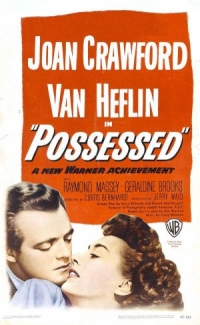Plot
A woman wanders through Los Angeles, saying little more than "David". Admitted to a hospital's psychiatric ward in a catatonic stupor, and interrogated by a doctor, she calls herself Louise Howell, and recounts her life in intermittent spurts, starting with her memory of her lover David Sutton playing Schumann for her, she saying, "I want to have a monopoly on you." He does not return her passion, but returns her home in a boat, and tells her their relationship is over.
She lives, and works as a nurse, at the lakeside home of the Grahams. Louise takes care of Pauline, the invalid wife of Dean Graham. Pauline is irascible and venomous, and thinks Louise is having an affair with her husband; Louise wants to leave.
Later, the police trawl the lake and find Pauline's body. Dean says she killed herself. The Graham children Wynn (a young boy) and Carol (a college-age young woman) return home. A coroner's hearing is held, with a verdict of accidental death. Afterwards, Louise encounters Carol, who angrily says Pauline's letters said Louise was attractive to Dean. Carol wants Louise to leave; Dean, who has arrived, demands Carol apologize, and slaps her.
David comes by, and says Dean's oil business needs him as an engineer; he is hired. Louise speaks to him and thinks he has another woman, which he denies. Louise goes with the Grahams to Washington, D.C., taking care of Wynn. David happens to be there, and Louise starts drinking and looks strained; he says he is out of love with her forever, and she slaps him. She says she'll quit her job, but Dean asks her to marry him; she agrees, even though she says she is not in love with him, which he accepts.
Louise visits Carol at college, wanting to be liked by her; there is a reconciliation. At the wedding, the uninvited David arrives late, and speaks to the crying Carol, who says she asked him for marriage at 11 years of age, which he remembers. Louise warns him away from Carol, and tells him to leave.
Later, Carol invites him over to their box at a piano recital; Louise has a distressed recollection of David at the piano, and leaves. At home, she has a lengthy hallucination: Carol returns with David, who kisses Carol. Louise confesses to killing Pauline. Carol says she'll tell Dean; Louise hits her, and she rolls down the stairs and dies. After the hallucination ends Carol then comes home for real, but not with David.
Louise, feeling disturbed, visits a doctor under a false name, and is recommended to go to a psychiatrist, but walks out. She asks Dean for a divorce; Dean asks why, and Louise says Pauline hates her. On a vacation back at the lake house, Louise climbs to Pauline's bedroom, screams, and when Dean runs up there, Louise says Pauline is in the room, saying to her, "Kill yourself, Louise". Dean says she's dead, and turns on the light; Louise doesn't see her any more, but confesses to helping her kill herself. Dean says that was false, as Louise was in the village on her day off.
Back at their regular home, Louise, happy to be free of Pauline's ghost, wants to go dancing; but she and Dean see David and Carol at the nightclub. Louise later lies to Carol that David really wants her, Louise. David drops by, and confronts Louise, who says Carol said she, Carol, is tired of David. Louise then admits lying, and that she's willing to do anything to keep David; he threatens to tell Dean about Louise and their past.
Dean confronts Louise, and says a doctor will come see her; she gets angry that it's a mental specialist, though she agrees to talk to him. She sneaks away to David, and says she is worried about being institutionalized. David says he will call Dean, and that he is going away that night to marry Carol. Louise gets out a gun; he taunts her, and she shoots him repeatedly.
She awakens at the hospital, and admits killing David. Dean visits, and the doctor says it is psychosis, as if she is possessed of devils, but he can restore her. He also says her tortured mind and delusion that she helped Pauline kill herself, made her present condition almost inevitable, and that if he had seen her sooner, her problems could have been averted. Re the upcoming trial about David's death, the doctor says Louise is not responsible for any of her actions. They go see the sleeping Louise, and the doctor says the healing process will be long and difficult, and she'll suffer a great deal before recovery. Dean pledges to help support his wife recover fully, no matter what.
